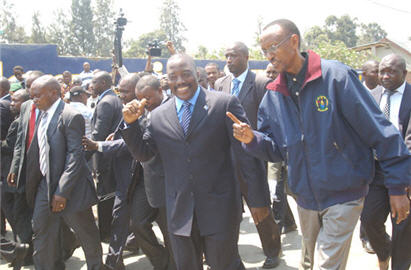
The BBC has seen a draft UN report that says crimes by the Rwandan army and allied rebels in Democratic Republic of Congo could be classified as genocide.
The report details how they targeted Rwandan Hutu refugees and Congolese Hutus in DR Congo, from 1993-2003.
It lists human rights violations committed by security forces from all countries involved in what has been called an "African world war".
The final report should be made public in the next few days.
The draft sheds light on 10 years of atrocities committed against civilians on the Congolese territory. The country was known as Zaire until 1997.
But more importantly, it brings details to the unresolved debate over the question of alleged genocide of ethnic Hutus between 1996 and 1998.
'Rwandan pressure'
About 20 human right officers have documented, through hundreds of pages, what they call widespread and systematic attacks by the Rwandan army and the Congolese AFDL rebel movement.
Those targeted were Rwandan Hutus who had fled into Congo after the genocide against ethnic Tutsis in Rwanda.
But the report says that attacks against Hutus who were not refugees seem to confirm that all Hutus were targeted.
In some regions, it says, checkpoints were used to identify people of Hutu origin and eliminate them - estimating that tens of thousands had been killed.
According to the report, such acts suggest a premeditated and precise methodology. Moreover, many of the victims were children, women, elderly people and the sick.
The UN investigators have also gathered information on alleged crimes committed by the security forces of many of the countries and armed groups involved in what had become a regional war.
However, Congo expert Jason Stearns says this report will greatly tarnish the reputation of the current Rwandan government that prides itself on having brought to an end the genocide against Tutsis in 1994.
Sources close to the investigation say that the Rwandan authorities have put pressure on the UN to tone down the report.
But the UN High Commission for Human Rights has refused to comment until the final report is published.
Related articles
- • DRC and Rwanda Sign Declaration of Principles for Peace in Eastern Congo (April 25, 2025)
- • European Union Sanctions Rwanda and M23 Officials over Congo Conflict (March 17, 2025)
- • Canada and Germany Impose Sanctions on Rwanda for Supporting M23 Rebels (March 4, 2025)
- • UK Suspends Financial Aid to Rwanda Over M23 Rebellion (February 25, 2025)
- • European Union Suspends Defence Consultations with Rwanda (February 24, 2025)
- • Tshisekedi Announces Government of National Unity and Calls for Unity Against M23 Rebels (February 23, 2025)
- • UN Security Council Calls on Rwanda to Stop Supporting M23 Rebels in DR Congo (February 22, 2025)
- • US Sanctions Rwanda's Minister James Kabarebe for Central Role in DR Congo Conflict (February 20, 2025)
- • Rwanda-Backed M23 Rebels Summarily Executed Children in Bukavu, UN Reports (February 19, 2025)
- • DR Congo Citizens Head to Polls to Elect President, Members of Parliament (December 20, 2023)
- • Ebola outbreak declared an international Public Health Emergency (July 17, 2019)
- • Felix Tshisekedi Sworn In as DR Congo President (January 24, 2019)
- • Constitutional Court Declares Tshisekedi Winner of Presidential Election (January 19, 2019)
- • Felix Tshisekedi Vows to Be the President of All Congolese (January 10, 2019)
- • Felix Tshisekedi Elected DR Congo President (January 10, 2019)
- • DR Congo Delays Results of December Election (January 6, 2019)
- • Botswana Urges Joseph Kabila to Step Down (February 26, 2018)
- • No elections in DR Congo in December without electronic voting machines: INEC (February 13, 2018)
- • US Warns DR Congo Against Electronic Voting for Delayed Election (February 12, 2018)
- • Felix Tshisekedi accuses INEC of illegally prolonging Kabila's mandate (October 24, 2017)
- • DRC Seeks Arrest of Presidential Candidate Moise Katumbi (May 19, 2016)
- • Papa Wemba Is Buried in Kinshasa (May 4, 2016)
- • Papa Wemba Awarded Highest National Honor as Thousands Pay Tribute (May 2, 2016)
- • Peacekeepers, Congo Army to Resume Joint Fight Against Rwandan Rebels (January 28, 2016)
- • Political tensions 'running high' in DR Congo ahead of 2016 elections (October 7, 2015)
- • UN Report Blames Ugandan Islamists for 237 Killings in DR Congo (May 14, 2015)
- • Rights Groups: DR Congo Must Free Pro-democracy Activists (April 13, 2015)
- • DRC Army Putting Pressure on FDLR (April 1, 2015)
- • Police Open Fire on Crowd Protesting Election Law Change (January 19, 2015)
- • Etienne Tshisekedi Evacuated to Belgium for Medical Treatment (August 16, 2014)







